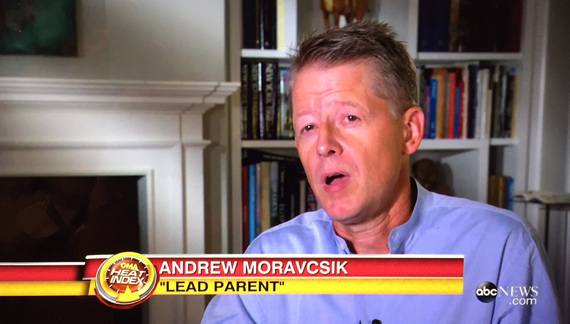Yesterday, Andrew Moravcsik wrote a thoughtful article in The Atlantic titled "Why I Put My Wife's Career First".
It was an honest account of his role in the family he has created with his wife Anne-Marie Slaughter. Much of what Andy wrote resonated with my experience as a stay-at-home dad, although he uses the term "lead parent" to encompass household leaders who work as well as those who are unpaid. He graciously mentioned me as an insightful commentator.
As the subtitle of his piece indicated he was writing in support of a broader social change that both he and Anne-Marie have been advocating for some time.
The well-being of children, the status of women, and the happiness of men will depend on whether more fathers are willing to take on primary parenting roles.
This morning, ABC's Good Morning America show headlined Andy's piece under the title "Mr. Mom."
One can imagine a sleep-deprived copy editor resorting to that term at 5 a.m. as the breakfast show deadline loomed, but unfortunately it totally misses the point of Andrew's article. In fairness, to ABC, the panel discussion afterwards was much more on point.
I've been called "Mr. Mom" before. Interestingly, I can only recall women using it.
It doesn't really bother me. It is a bit like an Irish joke. Just as I've moved beyond the patently absurd stereotype that Irish people are stupid, that the O before my name is indicative of my IQ score, "Mr. Mom" washes over me like some distant cultural relic.
But that is me. I am there. I am quite comfortable in my role running our household.
I suspect most other men are not ready to join me as the home-maker. Andrew's article details the social and cultural biases facing men as lead parents;
Pew polls show that 42 percent of Americans now view the "ideal" family for child-rearing as one in which Dad works full-time and Mom works part-time; about half prefer that she not work at all. Only 8 percent believe children are better off with Dad at home. About two-thirds of Americans believe that a married man should be able to support his family financially, yet only a third say the same about a woman.
These expectations present quite a hurdle for a man who is contemplating taking on the role of lead parent.
If you are starting out on the journey, "Mr. Mom" is not a cultural relic. It is a rock rolling down the mountain you are trying to climb. If you get hit by enough rocks you are not going to ascend very far.
That is why we should stop using it.
Language matters. Its effect is subtle. An individual word or phrase has small impact, but the cumulative result of its repeated use is massive.
Language both reflects and creates culture. It is a self-perpetuating system. If you can change the language you can alter the culture. The results are not always perfect. Stereotypes are hard to break down, but those who complain about political correctness are usually on the wrong side of the cultural shift.
Fifty years ago, Donald Trump would have been in the unchallenged majority talking about a woman having an unelectable face. Today, he is a cultural dinosaur who, apparently, doesn't look in the mirror.
The place of women in our society has shifted in that time.
"Mr. Mom" is an indicator that men's roles are lagging.
